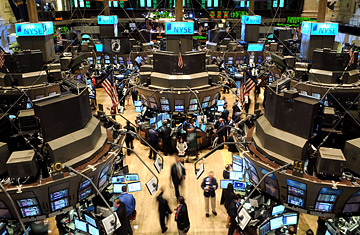
Traders work on the floor of the New York Stock Exchange
For stock-market investors, this week was the worst ever. The Dow industrials fell a record 18%, with the NASDAQ down 15% and the S&P 500 off 18%, as the crisis that has been roiling debt markets finally slopped over to equities in full force. The euphoria of the last hour of trading on Friday — when major markets turned positive and then ended the day only slightly down, with the Dow dropping a relatively modest 128 points, to 8,451.19 — hardly offset the terror of a rambunctious 700-point drop in the Dow at the opening bell. Events were so overwhelming that when the cost of a barrel of oil hit a 13-month low, the news barely registered. At 2 p.m., the VIX — a measure of expected stock-market volatility often taken as a gauge of investor fear — hit an all-time high.
The mood around New York City, as among mom-and-pop investors around the country, went from worry to confusion to, at times, cautious optimism, only to circle back to fear. At a panel discussion on Friday on the seventh floor of the New York Stock Exchange, JPMorgan Chase CEO Jamie Dimon was asked how much more credit crisis is left to play out. "Nobody really knows," he said. "Clearly we're in the panic stage of unreasonable behavior." At the Connecticut offices of UBS, nervous colleagues passed around a joke about why the market was like a divorce but worse: "I've lost half my net worth, and I still have my wife." Off-color humor for off-color times.
In a way, we were due for a stock-market smackdown. For 14 months debt markets have been stressed — and practically catatonic since mid-September. "Maybe it's a surprise, with 20/20 hindsight, that stocks held up as well as they did for as long as they did," says Bob Doll, chief investment officer for equities at BlackRock. "At the end of the day, lower-quality credit and stocks do have some things in common." The fear that has made investors shy away from all but the safest of debt finally moved on to the next logical step: fear of stocks, which inherently are riskier investments.
Then why the late-Friday rebound? Certainly not from any significant easing in credit markets, where most measures of banks' unwillingness to lend to each other remained off the charts. And yet the late-afternoon sell-off that investors had come to expect — from hedge funds and other investors freeing up cash to make margin calls and pay clients wanting to withdraw money — didn't come. Instead, around 3 p.m., indexes began to rise.
To assign a single cause to the behavior of stock markets — which are aggregations of thousands of companies — is at best difficult and at worst foolish. Nonetheless, there were events that were hard to ignore. Insurance contracts tied to the debt of the now defunct Lehman Brothers were finally settled up, and — after much breath-holding — no other firms unraveled. In Washington, black SUVs and town cars of the G-7's central bankers and Treasury officials rolled into town, bringing with them the hope that the people with the power to fix things — assuming there are such people — will collectively figure out a plan. On Friday, some investors even dared to start talking about the possibility of a market bottom.
It was a nice sentiment to take home and enjoy over the weekend. At least until trading starts again on Monday.
— With reporting by John Flowers / New York
